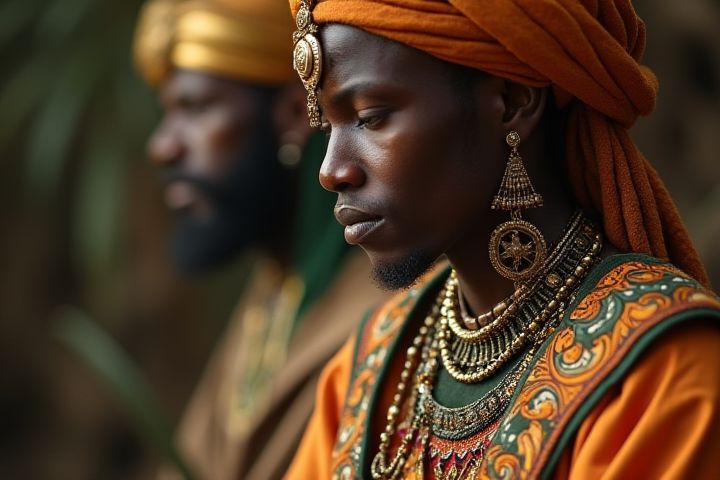
Nigeria is a religiously diverse country featuring a rich tapestry of beliefs, primarily divided between Islam and Christianity. Islam, predominantly practiced in the northern regions, is characterized by its adherence to the teachings of the Quran and the traditions of the Prophet Muhammad. Christianity, well-established in the southern and central parts, encompasses various denominations such as Catholicism, Anglicanism, and Pentecostalism. In addition to these major religions, indigenous African beliefs and practices continue to play a significant role in the cultural landscape, reflecting the country's ethnic diversity. Understanding Nigeria's religious framework is essential for appreciating its societal dynamics and the interplay between different faiths.
Predominantly Islam and Christianity
Nigeria's religious landscape is predominantly characterized by Islam and Christianity, the two major faiths that significantly influence its culture and society. Approximately 50% of the population practices Islam, primarily in the northern regions, where it shapes governance, social norms, and daily life. Conversely, Christianity is mostly concentrated in the southern and central parts of the country, impacting education, social services, and community dynamics. The coexistence of these two religions often leads to vibrant interfaith dialogues, as well as occasional tensions, reflecting Nigeria's diverse cultural tapestry.
Significant traditional religions
Nigeria is home to a rich tapestry of significant traditional religions, with varied beliefs anchored in ancestral worship, nature, and community rituals. Yoruba religion, practiced predominantly in the southwest, emphasizes the veneration of deities known as Orishas, along with ancestors revered for their guidance. In the north, the Hausa-Fulani people often incorporate Islamic elements into their traditional practices, showcasing a unique blend that reflects the region's historical interactions. You can explore the intricate universe of traditional beliefs, which often include sacred sites, festivals, and rites that play a crucial role in the cultural identity of millions in Nigeria.
Regional religious divide
Nigeria exhibits a significant regional religious divide, primarily between Islam and Christianity. In the northern regions, the majority of the population identifies as Muslim, adhering to Islamic traditions and practices, which are deeply interwoven with local cultures and governance. Conversely, the southern parts of Nigeria predominantly follow Christianity, with various denominations influencing societal norms and lifestyles. This religious segmentation has profound implications for social cohesion, political dynamics, and intercommunal relationships across the country.
Religious tolerance emphasized
Nigeria is a diverse nation with a rich tapestry of religious beliefs, primarily dominated by Islam and Christianity, along with traditional African religions. Religious tolerance is crucial in fostering peaceful coexistence among these varied faiths, encouraging dialogue and understanding among different communities. Many Nigerian organizations actively promote interfaith initiatives, aiming to bridge the gap between religious divides and combat extremism. Emphasizing religious tolerance not only enhances social harmony but also enriches cultural exchange and community development throughout Nigeria.
Rise in Pentecostalism
Nigeria has witnessed a significant rise in Pentecostalism, a movement characterized by its emphasis on personal faith, direct experiences with the Holy Spirit, and charismatic worship. This growth is largely driven by vibrant congregations that offer hope and empowerment in a socio-economic landscape fraught with challenges. Many Nigerians are drawn to the dynamic services, healing rituals, and prosperity teachings prevalent in Pentecostal churches, fostering a sense of community and belonging. As a result, Pentecostalism has emerged as a dominant force within Nigeria's religious landscape, influencing cultural practices and social dynamics across the nation.
Influence of religion in politics
Nigeria's religious landscape is characterized by a significant interplay between Islam and Christianity, with Islam predominantly practiced in the northern regions and Christianity in the south. This religious dichotomy heavily influences political dynamics, often resulting in sectarian tensions and power struggles that shape electoral outcomes and governance. Political leaders frequently align themselves with religious groups to mobilize support, impacting policy-making and national unity. Understanding the role of religion in Nigeria's politics is crucial for grasping the complexities of its socio-political challenges and development strategies.
Interfaith dialogue initiatives
Nigeria is characterized by its religious diversity, primarily involving Islam and Christianity, alongside indigenous beliefs. Interfaith dialogue initiatives in Nigeria aim to foster understanding and coexistence among these varied faiths, particularly in regions experiencing conflict. Organizations and community leaders actively promote discussions and collaborative projects, emphasizing shared values such as peace, tolerance, and social justice. These initiatives not only contribute to conflict resolution but also empower participants to address socio-economic challenges through a collective religious lens.
Role of religious leaders in society
Nigeria is a country with a diverse religious landscape, primarily dominated by Islam and Christianity, along with indigenous African spiritual practices. Religious leaders play a crucial role in guiding their communities, offering spiritual direction, and addressing social issues such as poverty and education. In many areas, these leaders act as intermediaries between the people and government, advocating for social justice and community development initiatives. The influence of religious leaders in Nigeria extends beyond the spiritual realm, impacting cultural norms, moral values, and even political decisions within society.
National religious holidays
Nigeria, a diverse nation, predominantly practices Islam and Christianity, with a smaller percentage adhering to indigenous religions. National religious holidays reflect this pluralism, prominently featuring Eid al-Fitr and Eid al-Adha for Muslims, which celebrate the end of Ramadan and commemorate Abraham's willingness to sacrifice his son, respectively. Christians observe Christmas and Easter, marking the birth and resurrection of Jesus Christ. These holidays highlight Nigeria's rich cultural tapestry and encourage communal gatherings, fostering unity among different faiths.
Sharia law in northern states
In Nigeria, the northern states predominantly practice Islam, with a significant focus on Sharia law, which governs various aspects of life, including personal conduct, family matters, and criminal justice. This legal framework is implemented alongside Nigeria's secular legal system, often leading to tensions between Islamic and civil law. The application of Sharia varies among the northern states, with some adopting a more rigorous interpretation, impacting education, women's rights, and economic practices. Understanding the cultural and religious significance of Sharia in these regions is essential for grasping the social dynamics and governance challenges faced by Nigeria today.
